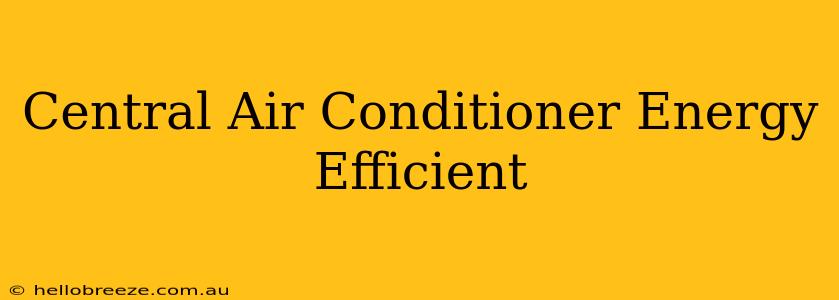Staying cool during summer's sweltering heat is essential, but soaring energy bills can quickly dampen the mood. Choosing an energy-efficient central air conditioner is crucial for both your comfort and your wallet. This guide explores how to select and maintain an energy-efficient system, helping you save money and reduce your environmental impact.
Understanding SEER Ratings: Your Key to Efficiency
The Seasonal Energy Efficiency Ratio (SEER) is the most important factor to consider when buying a central air conditioner. SEER measures the cooling output over an entire cooling season, relative to the energy consumed. Higher SEER ratings mean greater energy efficiency. While minimum SEER ratings vary by region and year, aiming for a system with a SEER rating of 16 or higher is a wise investment for long-term savings. Look for models with SEER ratings of 18, 20, or even higher for exceptional energy efficiency.
Beyond SEER: Other Efficiency Factors
While SEER is paramount, other factors contribute to overall energy efficiency:
- Energy Star Certification: Look for the Energy Star label. This indicates the unit meets stringent energy-efficiency guidelines set by the Environmental Protection Agency (EPA).
- Variable-Speed vs. Single-Stage Systems: Variable-speed systems adjust their cooling output based on the room's temperature, providing consistent comfort and reducing energy waste compared to single-stage systems that run at full blast or off.
- Proper Sizing: A system that's too large or too small will be inefficient. Professional sizing is essential to ensure your air conditioner works optimally for your home's size and layout.
Tips for Maximizing Central Air Conditioner Efficiency
Even the most efficient AC unit can lose efficiency if not properly maintained and used. Here are some simple steps:
- Regular Maintenance: Schedule annual professional maintenance to ensure your system is running smoothly and efficiently. This includes cleaning or replacing air filters, checking refrigerant levels, and inspecting components for wear and tear.
- Clean or Replace Air Filters Regularly: Clogged air filters restrict airflow, forcing your system to work harder and consume more energy. Change them every 1-3 months, or more often if necessary.
- Seal Air Leaks: Air leaks around windows, doors, and other areas allow cooled air to escape, reducing efficiency and increasing energy consumption. Seal these leaks with caulk or weatherstripping.
- Programmable Thermostat: A programmable or smart thermostat allows you to customize your cooling schedule, saving energy when you're away or asleep. Consider setting it a few degrees higher when you are away from home.
- Use Ceiling Fans: Ceiling fans can significantly reduce the need for air conditioning, creating a more comfortable environment with lower energy consumption.
- Proper Landscaping: Strategic landscaping can help shade your home, reducing the amount of heat absorbed during the day.
Investing in an Energy-Efficient Future
Choosing and maintaining an energy-efficient central air conditioner is a smart investment for both your comfort and your budget. By understanding SEER ratings, employing efficient usage practices, and scheduling regular maintenance, you can significantly reduce energy costs and minimize your environmental impact. Remember, a slightly higher upfront cost for a high-efficiency unit will likely pay for itself over the system's lifespan through lower energy bills. Contact a reputable HVAC professional for a consultation and to find the best system for your home's needs.

